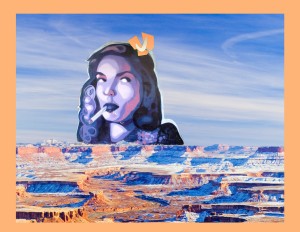“I am a man,” writes Ursula Le Guin in her book the wave in the mind: Talks and Essays on the Writer, the Reader, and the Imagination. She doesn’t mean it literally; instead, she’s making some potent observations on the past and present of Western culture.
She goes on. “Women are a very recent invention. I predate the invention of women by decades.” I love this! She’s telling a tall tale that makes us look at the world with fresh eyes and laugh at it. It’s the sugar that makes bitter truths go down.
“So when I was born,” she continues, there actually were only men. People were men. They all had one pronoun, his pronoun; so that’s who I am.”
She’s not, however, a particularly successful man: “I can’t write my name with pee in the snow, or it would be awfully laborious if I did.”
Le Guin goes on to explain all the other ways she fails at being a man, and then points out that she’s not much good at being young either, and suggests that perhaps she might as well start pretending that she is an old woman. “I am not sure that anybody has invented old women yet; but it might be worth trying.”
Of course she isn’t a man; she is an old woman, and a mighty fine one at that. If I’m ever fortunate enough to become an old woman, and I can pull it off half as well as she does, I’ll be happy. I hope she stays an old woman for a long, long, long time.
But I do resonate with what she says. I’m a man too. A feminist man. I became a feminist boy at the age of ten, when I read Enid Blyton’s Famous Five series and identified so strongly with George, the girl who insisted on being called a boy. George believed that boys were better than girls, and by being a boy, she was better than a girl.
Feminist discourse was right there with me, for quite a while. Women could be as good as men, but only by becoming like them. I didn’t see a separate and worthwhile female identity for a long time — or rather, it’s come into focus only slowly, as I stay home, do housework, and raise kids. I have to keep reminding myself that my work is valuable and important.
(That means it’s time to take an intermission from this blog post and listen to Carole King singing about The Enchanted One.)
Okay, that’s better. Anyhow, I’m gradually coming around to the concept that I might be a woman. Dresses — no. Purses — no. Lipstick and eyeshadow — no. Girls’ night out — you bet! Listening to the Verity Podcast — absolutely! Favoring books by woman — yes! It seems my gender changes as my activities change. Maybe that’s my superpower.
I absolutely loved what Ursula Le Guin had to say about women at the 2010 Winter Fishtrap gathering, themed “Learning From Women.” She was uncomfortable with defining what a “woman” was, and pointed out that women are required to learn how to be men, but the same is not true in reverse. A proposal went out that we might honor the men in the audience by letting them be honorary women. Well, that was mind-blowing!
Okay, now, I’ve managed 548 words without talking about Doctor Who, even though I’m really, REALLY excited about Doctor Who right now. We just saw an episode where a woman, Clara, played a man, the Doctor. She did it flawlessly. Why, she’s as good as a man! Who knew? (Or you could look at it another way: the role of Doctor turned out to be gender-neutral and to fit a man or a woman equally well.)
So how come, I wonder to myself, how come I didn’t get all excited about seeing a woman Doctor, but instead wrote a blog post all about the man, and what he’s thinking and feeling? That question is right up there with, “Well, I’m a feminist, so why am I taken with this quite patronizing and patriarchal character?” Also, “If the role were to be played by a woman, would I like it as much?”
Another question: when I watch the show who am I identifying with? The female companion or the male Doctor? The answer is both, and that sometimes it’s one more than the other. When I first started watching the Doctor Who, I identified most strongly with the female companion, Zoe. She was about my age, and a good student, and she got to one-up the Doctor intellectually from time to time. I also identified with Liz Shaw, Jo Grant, Sarah Jane, Nyssa, and Ace.
Right now, though, I’m mostly identifying with the Doctor, as played by Peter Capaldi. And I’m doing it whenever he has a difficult choice to make or an ethical question to consider.
Curious.




